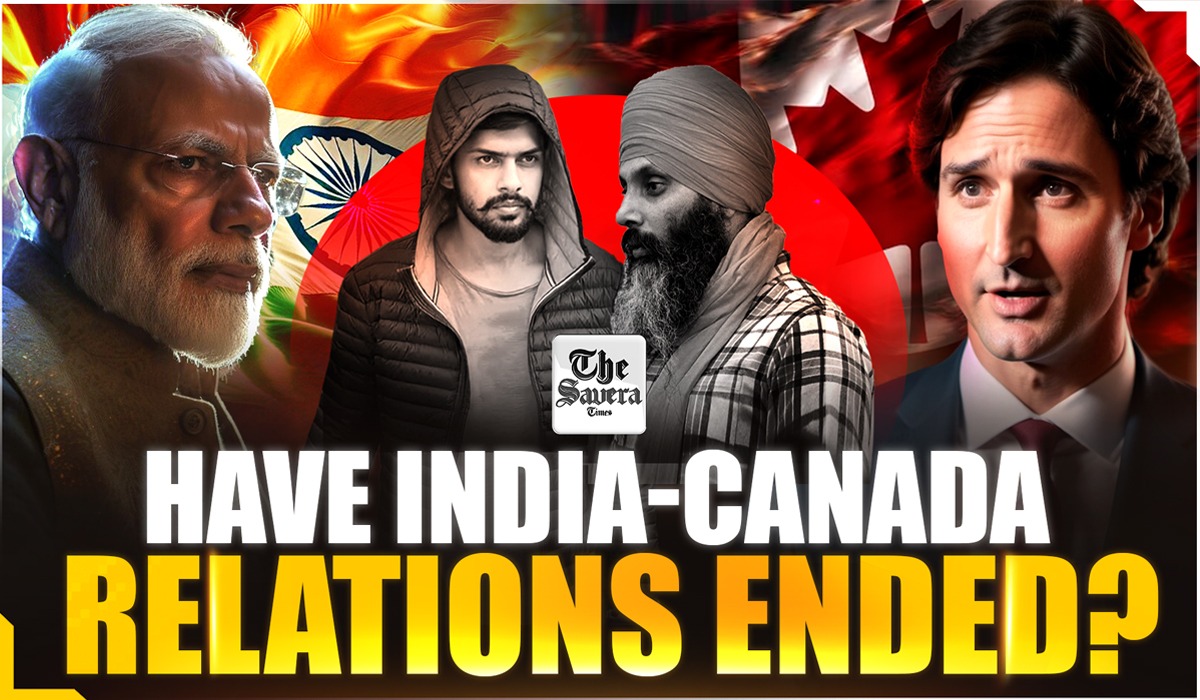
By Sahil Sharma: In a stunning turn of events, the simmering tensions between India and Canada have erupted into a full-blown diplomatic crisis, described as a “diplomatic nuclear bomb.” Over the last few days, relations between the two once-close allies have deteriorated rapidly, culminating in the suspension of diplomatic ties. The ramifications are severe, with millions of rupees in trade hanging in the balance and the futures of thousands of students now uncertain.
Watch The Explainer Here:
Canada’s Accusations
The diplomatic rift reached a boiling point when the Canadian government accused India of using gangsters like Lawrence Bishnoi to track down and eliminate Canadian-Palestinian sympathizers, disrupting Canada’s democratic processes. Prime Minister Justin Trudeau’s government has publicly claimed that Indian officials, including high-ranking diplomats, were involved in illegal activities on Canadian soil. Allegedly, these officials gathered intelligence on pro-Khalistani individuals, who were then threatened or assassinated.
The accusations reached their peak when the Royal Canadian Mounted Police (RCMP) held a press conference, accusing Indian diplomats of involvement in criminal activities. Canadian officials have arrested several individuals linked to extortion and murder, some allegedly connected to the Indian government.
India’s Diplomatic Retort
The Indian government has responded firmly, rejecting Canada’s accusations as baseless and demanding evidence. In a stern response, India has called for Canadian diplomats to leave the country and issued a statement questioning the credibility of Prime Minister Trudeau’s administration. The Indian Ministry of External Affairs has accused Trudeau of engaging in “vote bank politics” and hinted that the Canadian government’s actions are politically motivated.
India has also issued a rare diplomatic statement, warning that if Canada continues to target Indian officials and harbor extremist elements, it will retaliate. This escalates the situation to a level rarely seen outside of India’s relations with Pakistan during times of conflict.
The Fallout and its Consequences
On October 13th, the Canadian government informed India’s Ministry of External Affairs that several Indian diplomats were persons of interest in an ongoing investigation. By October 14th, the Indian government had summoned Canada’s highest-ranking diplomat and expelled six Canadian diplomats, including Stewart Wheeler, as relations continued to unravel.
The most immediate impact of this diplomatic fallout will be felt by Indian students and businesses. Over 300,000 Indian students are currently studying in Canada, and with diplomatic ties now effectively severed, their future hangs in the balance. Trade between the two nations, once a burgeoning sector, now faces a steep decline as both countries withdraw from bilateral agreements.
Is This the End of India-Canada Relations?
The breakdown in relations is especially significant given the long-standing partnership between India and Canada. Just a few years ago, both nations cooperated closely on trade, education, and security. However, the growing influence of pro-Khalistani groups in Canada, coupled with Trudeau’s stance on these groups, has driven a wedge between the two countries.
Canadian officials have claimed to provide India with evidence of wrongdoing, but so far, no concrete proof has been made public. The Indian government remains adamant that it has no involvement in illegal activities in Canada. Adding fuel to the fire is the fact that similar accusations have been made by the United States in the past, most notably in the case of Gurpatwant Singh Pannun, a designated terrorist in India and a U.S. citizen.
Where Do We Go From Here?
While the immediate future looks grim for India-Canada relations, there is still hope that diplomatic channels will remain open for dialogue. However, this will require both sides to step back from their current positions. India’s trade ties with Canada, as well as the livelihoods of Indian students and families, are at stake.
The question remains: can cooler heads prevail, or will this diplomatic standoff lead to a long-term fracture in the relationship? What is clear is that the international community will be watching closely as this situation unfolds, and the fallout from this crisis will have significant implications not just for India and Canada, but for global diplomacy as a whole.
For now, all eyes are on the next move from both governments and the hope that reason, rather than anger, will guide future actions.
